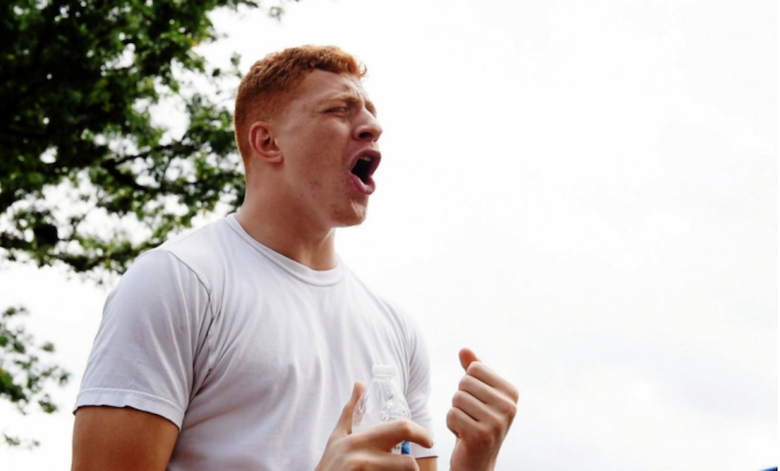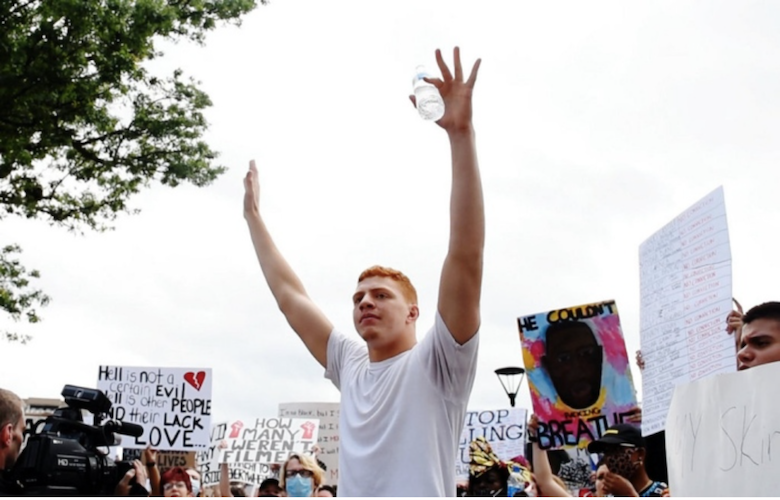Wilkes University senior Moustafa Almeky apologizes because his voice is hoarse when he joins an interview on Zoom. Although he might appear to be losing his voice, Almeky has actually found it as he’s become a vocal part of recent protests against racial injustice. He has been an ally to the black community, speaking at recent protests in Wilkes-Barre about the death of George Floyd while in police custody.
Almeky, a neuroscience and biology double major who lives in Shavertown, Pa., plans to attend medical school after graduation. A leader on campus, he is captain of the wrestling team, a resident assistant and president of the Student Athlete Advisory Committee. With his brother, Abdul ’20, he cofounded the University’s Islamic Society and serves as president of the youth group at the Islamic Center of Northeast Pennsylvania. His involvement with the Islamic community is what first sparked his interest in activism and participating in protests. Almeky’s desire for justice for all people has long been part of his personal commitment. He spoke with News@Wilkes about how people can become involved and what the role of an ally should be in the newest chapter of the fight for racial justice.
How did recent events involving George Floyd and Ahmaud Arbery convince you to become involved?
This has really caught the nation’s attention, but one of the main things to remember is that this isn’t something new. This is something we knew about before, but people are saying this is what broke the camel’s back. People have had enough. I think it is important to mention that it wasn’t just one incident that set this off. This was many, many incidents over many that led us to start this movement.
The importance of white allies in the current protests has been stressed, and that is what you have become. Can you talk about the importance of being an ally?
Ally – that is the key word. It can’t just be a movement for Black Lives Matter and people of color. It’s got to be all of us….We have to use what privileges we have to aid them on their path. But I have learned something about being an ally. On Sunday, I was a main speaker. I kind of ran the protest. I told everyone to get down and get in the position that George Floyd was in when he died. After the protest, the organizers came up and said they could see I was going to be involved as an ally and they said, “You need to make sure black voices are heard at these protests.” My job, any person’s job, as an ally is to aid black people, amplify their voices and make sure they are heard. To stand beside them and not in front of them…. It was a huge moment of growth for me this week, learning to be an ally.
We need change. We need to understand that something needs to happen. At one point, I asked the crowd, “Raise your hand if you are white and you would be happy to be treated like one of these black people have been treated.” Not one person raised their hand. I asked again and no one raised their hand. That means you know there’s a problem. That means you know we need to fix it and we haven’t done anything about it yet.

What advice would you give to someone who wants to begin to be an ally and get involved?
It may be cliché, but I can’t stress enough that you need to start with your heart. If your heart knows where it’s going, then you need to start with your home. If your home is good, you need to start with your community. What I mean by that is: Look at yourself. Are you racist? It’s not enough to not to be racist. You have to be antiracist. How are your parents? How is your uncle? How is your immediate family? You need to have those tough conversations around the kitchen table. Is that going to be easy? No. But the first place you need to start is at home if you want to make a change in the whole world. If there’s one good person in every a household and that person changes another person in the household and that whole household changes, then eventually the whole world changes…People ask me, why are you in protests in Wilkes-Barre? Don’t you want to go to Philadelphia? We need to change things right where we are first if we want to change the world. You need to make an effort. You need to start right where you are to make a change in the world.
Almeky’s activism was profiled in a recent story in The Citizens’ Voice in Wilkes-Barre. To read the story about him, please go here.






